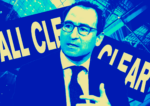Trending
Wall Street really likes Zillow’s new CEO
Rich Barton will lead transition from advertising model to home-buying business

Zillow Group CEO Rich Barton is back in the driver’s seat, and Wall Street likes what it’s seeing.
Shares of the Seattle-based listing giant rose to $42.67 as of noon on Friday, up 22.5 percent from Thursday’s closing price of $34.83 per share. Investors traded 11.3 million shares, compared to 2.7 million shares yesterday.
The pop came a day after Zillow not only announced a C-suite swap, but said it is doubling down on its home-buying business, which it expects to generate $20 billion in annual revenue in five years. As a point of comparison, Zillow Group generated $1.3 billion in 2018 revenue, the bulk of it from advertising programs like Premier Agent, the company reported Thursday.
“We see a compelling long-term TAM (total available market) opportunity in Zillow’s pivot,” Deutsche Bank analyst Lloyd Halmsley wrote in a research note Thursday. “And we think Rich Barton is a good jockey to lead the company on the moonshot opportunity.”
To hit $20 billion in annual revenue, Zillow said Thursday it plans to buy 5,000 homes a month in the next three to five years. During the fourth quarter, Zillow bought 499 homes and sold 141 homes. The segment generated just $41.3 million in revenue during the quarter, but the company said it gets a request for a Zillow Offer every five minutes — which they said represents $100 million in demand daily.
In the hours after Zillow’s pivot, Wall Street analysts endorsed the switch. “The announced CEO change came as a surprise but we expect the market to react positively as we believe investors will have more confidence in Rich Barton managing this massive transition,” said Brad Berning, an analyst at Craig-Hallum Capital Group.
RBC Capital Markets’ Mark Mahaney described outgoing CEO Spencer Rascoff as an “extremely skillful” CEO who led the company for nine years and will remain on the board. But Barton has been consistently viewed “as one of the best entrepreneurs, executives, and investors in the Internet space and are excited to see how he continues to strengthen Zillow’s platform.”
A Stanford graduate, Barton is a serial entrepreneur with a string of fruitful bets.
He joined Microsoft in the 1990s, he convinced Bill Gates to back Expedia.com in 1994. By 2003, Expedia was acquired by IAC and then spun off into its own company. In 2005, Barton — along with Rascoff and Lloyd Frink — launched Zillow, which Barton led for five years. He later teamed up with Robert Hohman and Tim Besse to start Glassdoor in 2007. Between 2005 and 2018, Barton was also a venture partner at the VC firm Benchmark, an investor that backed companies including Netflix, Instagram, WeWork and Zillow.
“You can name people who are richer than Rich, but you can’t name very many people who have his track record,” said Nick Hanauer, a venture capitalist and friend of Barton’s, told the New York Times for a profile of Barton in 2014.
Though Barton’s pursuits have bounced between industries, a common theme among them has been transparent information or what Barton calls “power to the people.” Recalling the genesis of Zillow in a 2016 interview, he said that it emerged from his own home-buying experience.
“We had to hire a professional and get a little drip-drip information,” he told the Seattle Times. Frink was going through the same thing, and the pair had an epiphany, Barton recalled. “We were like, ‘Oh my god this is so hard. It’s 2005 and the web has been around for 10 years. Why isn’t it easier for us to get basic marketplace information?’”
Historically, Barton hasn’t served as the CEO of companies he’s founded. “I’m a big believer that leadership is not granted. It’s earned and it’s earned from the people around and below you and not from above,” he told the Seattle Times in 2016.
But on Thursday, he said Zillow Group is an “an inflection point,” and that the time had come to shuffle leadership seats. “I have a certain penchant for and attraction to big swings,” he said during an earnings call.
In November, Barton bought up $19.2 million worth of Zillow stock after the company took a beating on Wall Street. In August, after Zillow reported that Premier Agent revenue was lower than expected, the company’s stock tumbled 15 percent overnight and investors bought and sold 18.7 million shares compared to 3.7 million a day earlier.
But Zillow’s bet on iBuying isn’t a sure thing, and it is part of an increasingly crowded field that includes Opendoor, Offerpad and Knock, not to mention brokerages like Redfin, Realogy and Keller Williams. “Listening to Rich Barton on the [Zillow Group] earnings call, I’m just sitting here thinking, ‘They should just acquire Opendoor,” tweeted Rob Hahn, founder of real estate consulting firm 7DS Associates.
In a research note, Goldman Sachs’ Heath Terry noted the significant costs and risks associated with Zillow’s focus on home-buying and mortgages, which are “amplified by the challenging housing and mortgage environment.”
“Zillow Group’s big hairy audacious goal around moving its business down-funnel from advertising to actual real estate transaction is a smart long-term move,” wrote Tom White, an analyst at D.A. Davidson, who said it’s also the sort of challenge Barton is “optimally suited” to oversee. But he cautioned it would take years to play out and may alienate some Premier Agent advertisers.
In an email to Zillow Group employees, Rascoff called the news “bittersweet.” He acknowledged that it is a “transformative time” for the company. “Rich, Lloyd and I worked closely since founding Zillow in 2005, and it feels like the right time to turn the triangle of partnership on its side,” he said.




